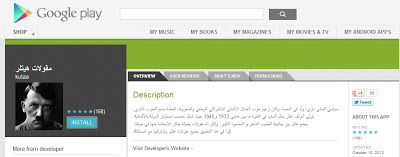Google, on the other hand, has made it much easier for developers to offer their apps in Google’s Android marketplace called Google Play. According to Google’s website users are asked to “not distribute content that promotes hatred or violence towards groups of people based on their race or ethnic origin and religion.” When Google is notified of potential policy violation, it “may” review and take action by removing or restricting content, however, it doesn’t have the same screening processes in place that Apple does for its app marketplace. Google’s checklist for app developers to submit their creations for consideration in Google Play includes the requirement that one informs Google Play users of the app’s maturity level before publish. The available content rating levels are: Everyone, Low maturity, Medium maturity, and High maturity. However, Google does not provide for apps that are created in bad taste. A Google spokeswoman explained that the company removes apps that violate its policies against hate speech.
Such is the case with a new app for users in search of inspiration from non other than Adolf Hitler. One app in the Google Play store is simply called “Adolf Hitler.” The description states, “All about Adolf Hitler. Get everything in one place – Bio, Pictures, Videos and Quotes. Not only can you get them in one place, you can share all your favorites with your friends in a click.” Another app, Infamous Adolf Hitler Quotes, proclaims: “Looking for Adolf Hitler Quotes?? Then this is the App for you!” The apps often provide a quote of the day and allow the users to search a database of anti-Semitic quotes including such things as, “Jews are like mosquitoes that suck our blood.”
While quotes from The Fuhrer are searchable throughout the Web using any search engine in any browser, mobile apps dedicated to glorifying Hitler’s hate speech are something else entirely. Hitler’s writings, famous quotes and excerpts from Mein Kampf should be readily available for research purposes on the Web, however, Google should think twice before marketing mobile apps that celebrate the words that motivated the Holocaust.
According to the Anti-Defamation League website, the free app from kutaa provides users with vile quotes attributed to Hitler and has been installed by over 10,000 users within 30 days through Google Play. The Arabic-language app, “Hitler’s Sayings,” allows users to read and share what it describes as Hitler’s “beautiful sayings that we could benefit from in our lives” via social media networks. A description of the app says, “Hitler combines the charisma of the skillful physician and the grand juggler…Read in this application all of Hitler’s sayings and share them with your friends.”
These free apps (some have been downloaded as many times as 50,000 times) are not being used by Holocaust scholars or those seeking to gain a better understanding of the Third Reich. Rather, they are being downloaded and installed to extend the reach of Neo-Nazis in the U.S. While the Arabic language app Infamous Adolf Hitler quotes from the Arab app maker kutaa seems to have been removed from Google Play (it’s still available for download at AppsZoom), other mobile apps tauting Hitler as an inspirational leader are popping up in the Android app market.
The other issue with these Hitler apps that extol the Nazi leader is the vitriolic language in the comments section on the review pages of the apps. In the user review section of one of the free English-language apps dedicated to Hitler’s quotes, one of the more than a thousand reviewers called Hitler a great moral leader. Another user writes in a review dated August 2012 that the “app is so great and useful,” and explains that he wanted to learn how Hitler was able to “kill all the yahudi people.”
In September of last year, Google removed a mobile app of the conspiracy theory book The Protocols of the Elders of Zion. Google eventually removed The Protocols app from its website amid a large public outcry. Google will continue to remove these apps that praise Hitler, but more Android apps will crop up to plague its app market. Google needs to be more vigilant in prohibiting such hate spewing apps from ever residing in Google Play in the first place.
Cross-posted to the Jewish Techs blog on The Jewish Week’s website





